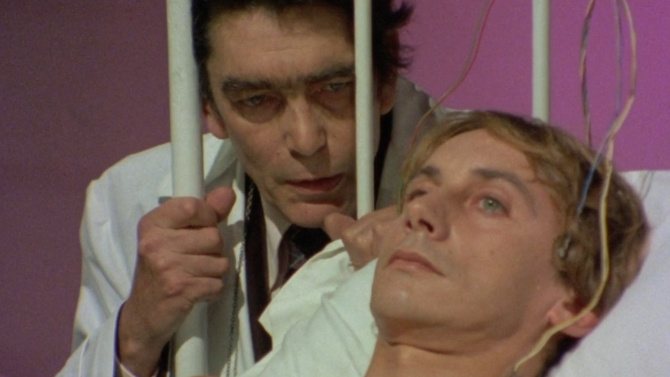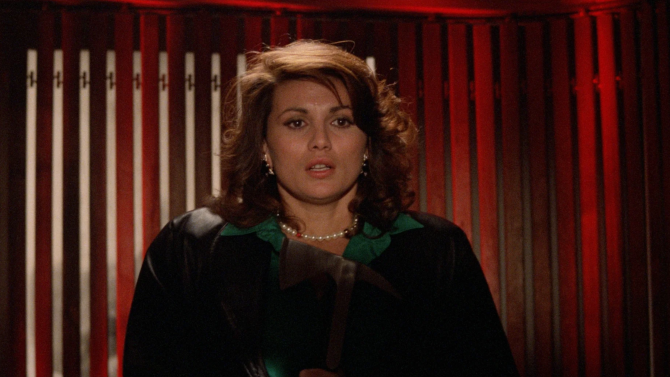
A Different Type of Photobomb
Some might know that icon Mario Bava is often considered to be the first filmmaker to make a giallo with 1963's The Girl Who Knew Too Much... though unless you’re a big fan of the genre, many will probably not know that his son, Lamberto Bava, continued on with the gialli tradition well past its heyday in the early 1970s – releasing a number of horror tinged mystery thrillers, including today’s Delirium (1987)... sometimes also known as The Photo of Gioia. Welcome to what very well could be the Italian rival of Hugh Hefner’s Playboy, fluffily called Pussycat – a high end nudie magazine that brings some class (and a bit of kitsch) to artistic nude photography. Run by former supermodel Gloria (Serena Grandi), she inherited the business when her husband tragically died.
-
Off Pat
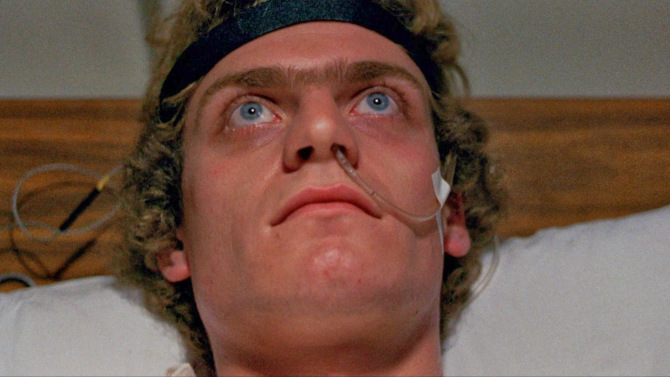 PatrickPatrick Still LivesOctober 15, 2024
PatrickPatrick Still LivesOctober 15, 2024Though only coming out some seven years into the growing number of low budget Australian exploitation pictures being made – now known as Ozploitation, Patrick (1978) was one of the first to bring outside attention onto these Down Under flicks. A bomb in its homeland but gaining traction in thirty foreign markets (including its all important success in the United States), this Richard Franklin (Psycho II) venture helped put Ozploitation on the map... something fully achieved the next year when Mad Max burst onto the scene.
-

Regula as a Clock
The Torture Chamber of Dr. SadismSeptember 26, 2024Loosely based upon Edgar Allan Poe’s 1842 short story, “The Pit and the Pendulum”, the violently titled West German film The Torture Chamber of Dr. Sadism (1967), directed by Harald Reinl, is a meandering 18th century set gothic horror mood piece starring the legendary Christopher Lee. For those of you who revel in the wild extravagance of how some of these European horror pictures have a list of different titles around the world, here we go – The Blood Demon, The Snake Pit and the Pendulum (perhaps an abandoned Indiana Jones title as well), Blood of the Virgins, and lastly, Castle of the Walking Dead. Now, reading that primary title, the first question might be... just who is this Dr. Sadism? And, of course, the answer that only makes sense is that it is clearly no one.
-
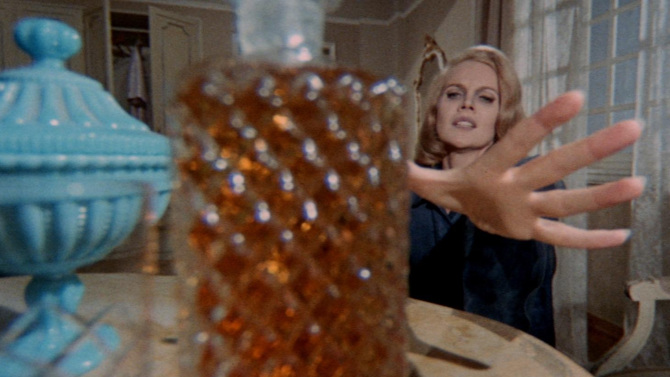
Paranoia, The Destroyer
OrgasmoSeptember 18, 2024You know you’re in the swinging sixties circa 1969 when the powers that be override the director and change the title of the film in its native Italy from Paranoia to Orgasmo. Keeping the original title for the American release, this Umberto Lenzi directed and Carroll Baker starring giallo becomes all the more confounding when considering that the film maker’s next feature also stars the same leading lady... and it is decided that it will be called Paranoia – leading to much confusion to this very day. The first of four movies the pair would make together in just a short four year period (all of which are reviewed on Filmizon.com), Orgasmo (aka Paranoia) follows seven week widowed alcoholic American socialite Kathryn West (Baker) as she flees the media attention in her native country, settling in picturesque Italy – where her lawyer (who also manages all of her assets), Brian Sanders (Tino Carraro), has found her a relaxing villa to stay in.
-
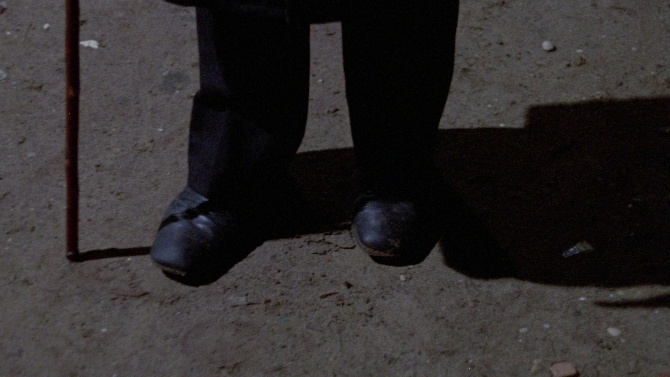
The Case of the Cane Mutiny
Death Carries a CaneAugust 31, 2024Don’t get the wrong idea... the 1973 giallo Death Carries a Cane, co-written and directed by Maurizio Pradeaux, may make it sound like the grim reaper-like killer at the centre of all the carnage is simply some feeble hop-a-long struggling to meander the streets of Italy, but that may not be the case when you hear some of the other titles that this film has been gifted for different markets or releases: Dance Steps on the Edge of a Razor, The Tormentor, Maniac at Large, The Night of the Rolling Heads, and Devil Blade... perhaps it’s a bit more ominous sounding now. Poor Kitty (Nieves Navarro; aka Susan Scott) is at the right place at the wrong time... showing her visiting parents some of the tourist sites in Rome, she just so happens to be looking through some pay-for-use binoculars on a hilltop when she witnesses the murder of a young woman (through a house window) by a silhouetted assailant wearing a black hat, overcoat and stylish sunglasses who has a bit of a hobble.
-
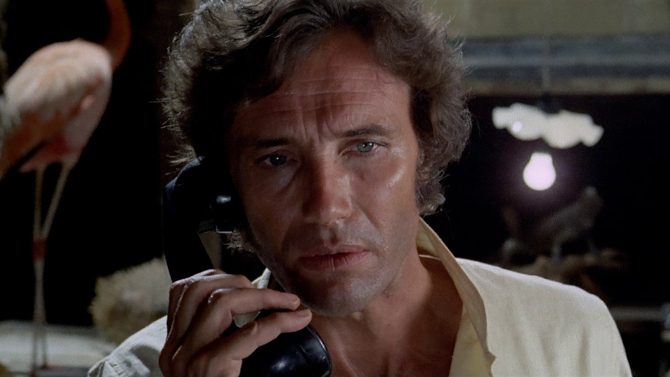
Italian Haitian Vacation
Tropic of CancerDecember 8, 2023The very Italian giallo meets burgeoning blaxsploitation in Port-au-Prince, Haiti in the 1972 crime mystery Tropic of Cancer (sometimes also referred to as Death in Haiti or Peacock’s Palace), directed by Giampaolo Lomi and Edoardo Mulargia (both also co-write along with star Anthony Steffen). A couple on the rocks, Fred and Grace Wright (Gabriele Tinti and Anita Strindberg), make their way to the island paradise to seemingly rekindle their relationship... yet the husband also plans on meeting up with long unseen friend Doctor Williams (Anthony Steffen). Unbeknownst to them (or is it), the M.D. and veterinarian by day and scientist by night (this guy can do everything) has discovered a rather desirable aphrodisiacal hallucinogenic drug formula that everyone is out to get – some legitimately, others not so much.
-
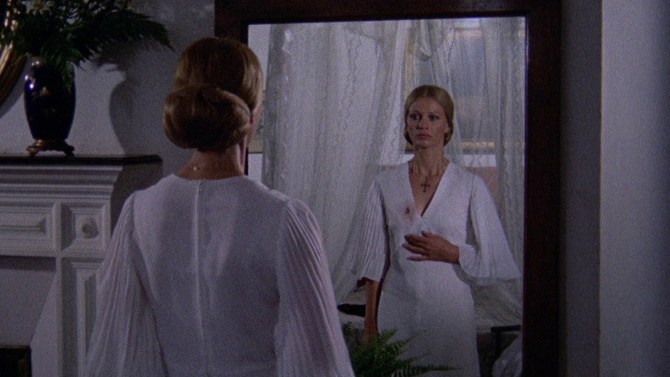
Nights in White Satin
A White Dress for MarialéSeptember 5, 2023There is no denying that our childhoods play a very large part in who we become as adults. The proof is in the quasi-giallo pudding when looking at the titular character in A White Dress for Marialé (1972) – it has also been known as Spirits of Death and Tragic Exorcism. Directed by Romano Scavolini, the aforementioned Marialé (Ida Galli, aka Evelyn Stewart) had a traumatic childhood – witnessing the murder of her mother and lover by her father, only for the patriarch to turn the gun on himself after offing the secretive couple. Finding herself in an equally as toxic relationship with Paolo (Luigi Pistilli), the wealthy man hides her away in a half impressive, half dilapidated castle in the middle of nowhere with his trusty banged butler Osvaldo (Gengher Gatti) – looking like an oddball combination of an eccentric Vincent Price and inhuman Lurch.

